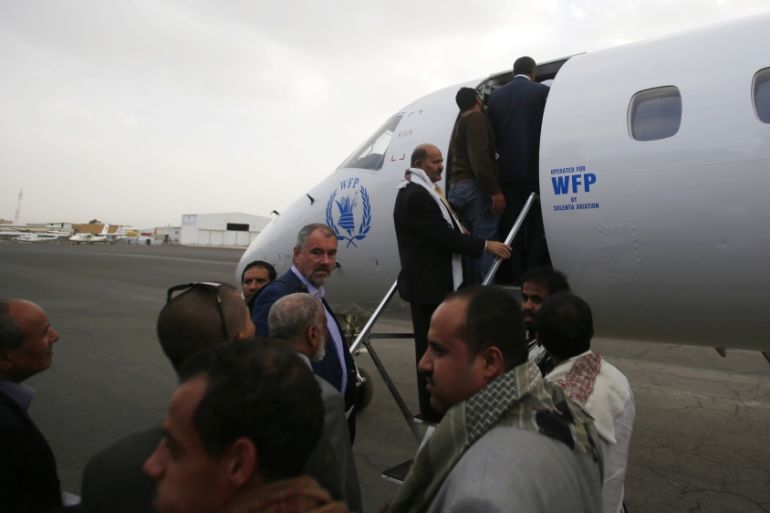Analysis: What now for Yemen?
Time is running out for the both sides in the Yemen conflict.

Recent attempts to peacefully end the current crisis in Yemen have proved unsuccessful. First there was the National Dialogue gathering, then the Riyadh Conference, and now the Geneva Conference – and all have failed to bring peace to Yemen.
From the beginning, both President Abd-Rabbu Mansour Hadi’s government, which is operating in exile from Riyadh, and the alliance of Houthi rebels and former President Ali Abdullah Saleh have maintained different views about the purpose of the Geneva talks.
Keep reading
list of 4 itemsUS sanctions shipping firm accused of links to Iran, Yemen’s Houthis
Vessel struck in Red Sea as Houthis promise attacks on more shipping lanes
What we know about deadly Houthi attack on cargo ship
Hadi’s government has been very cautious about going to Geneva, accusing the Houthis and Saleh of exploiting the recently adopted five-day ceasefire in order to expand the areas under their control. It has also accused the alliance of using humanitarian aid, especially oil, to assist the group’s war efforts instead of helping suffering civilians in conflict-torn areas.
RELATED: What the Riyadh conference failed to address
Before going to Geneva, Hadi’s government maintained that negotiations should not produce new peace plans or agreements, but rather focus on ways to implement the UN Security Council’s Resolution 2216, which calls for the withdrawal of the Houthi-Saleh alliance from all key cities and the return of Hadi’s government to Sanaa.
Having recently increased their military offensives in Taiz, Aden, and Jawf, the Houthi-Saleh delegates, on the other hand, went to Geneva with the goal of forcing the Arab coalition led by Saudi Arabia to accept a long-term ceasefire.
Moreover, both sides chose to send second-tier political leaders to Geneva, with full knowledge that such leaders would not be able to make significant concessions or breakthroughs on their own.
![Houthi rebels gather for an anti-Saudi rally in Sanaa [AP]](/wp-content/uploads/2015/06/445e17b200a649f19a30c17bda27b504_18.jpeg)
The Geneva conference was designed to be an all-Yemeni show, where emphasis would be placed on finding Yemeni solutions. Yet in reality, the key to solving Yemen’s current crisis lies in both Riyadh and Tehran, two countries that are not engaging in direct talks about the crisis.
The recent visit by the Saudi Deputy Crown Prince Mohammad bin Salman to Russia could offer a new opening in Saudi Arabia’s diplomacy for countering Iran.
Indeed, Russia is looking forward to seeing Prince bin Salman in Moscow, hoping that good relations with the oil-rich kingdom may help increase their own oil prices in the global market. But it remains to be seen how Russia could help end the war in Yemen.
Related: Millions face food emergency in war-torn Yemen
Can we now expect the warring actors to return once again to Geneva to resume talks? It is very likely that the United Nations, fearing that the worsening humanitarian situation in Yemen could push the country past the point of no return, will keep exercising pressure on all actors to do so.
Certainly, the humanitarian crisis in Yemen remains the most important element in the conflict and a crucial factor towards its solution. Saudi Arabia’s ability to continue its military-led coalition depends largely on the Yemenis’ ability to endure the burden of severe economic sanctions and the lack of basic life needs.
Saudi Arabia has a strategic security interest in continuing the military campaign until the total downfall or surrender of the Houthi-Saleh alliance. But the absence of any quick military triumph and the protracted suffering of Yemen’s population will complicate the coalition’s strategy.
The coalition can only hope for the rise of massive anti-Houthi protests as a result of the continued humanitarian crisis, in which Yemenis demonstrate that they have nothing to lose in the face of overwhelming misery.
|
The Saudi-led coalition can only hope for the rise of massive anti-Houthi protests as a result of the continued humanitarian crisis. |
But this could also be a double-edged sword by propelling the international community to encourage Saudi Arabia to accept an unconditional ceasefire, which, in return, would deepen the Houthi-Saleh control of many areas in Yemen.
Nonetheless, the Saudi-led coalition still has a very limited window of time to expedite the establishment of safe areas in Aden and other parts of the country, to help facilitate the swift transfer of Hadi’s government from Riyadh to Yemen.
Indeed, such an effort, if well-executed, would present an enormous setback to the Houthi-Saleh alliance and would, at the same time, boost the morale of the resistance movements in several areas.
For now, the failure of the Geneva conference means that time is running out for the two sides in the conflict – and that in the absence of either a quick military victory or a serious political solution, Yemen might go in an unexpected and uncontrollable direction.